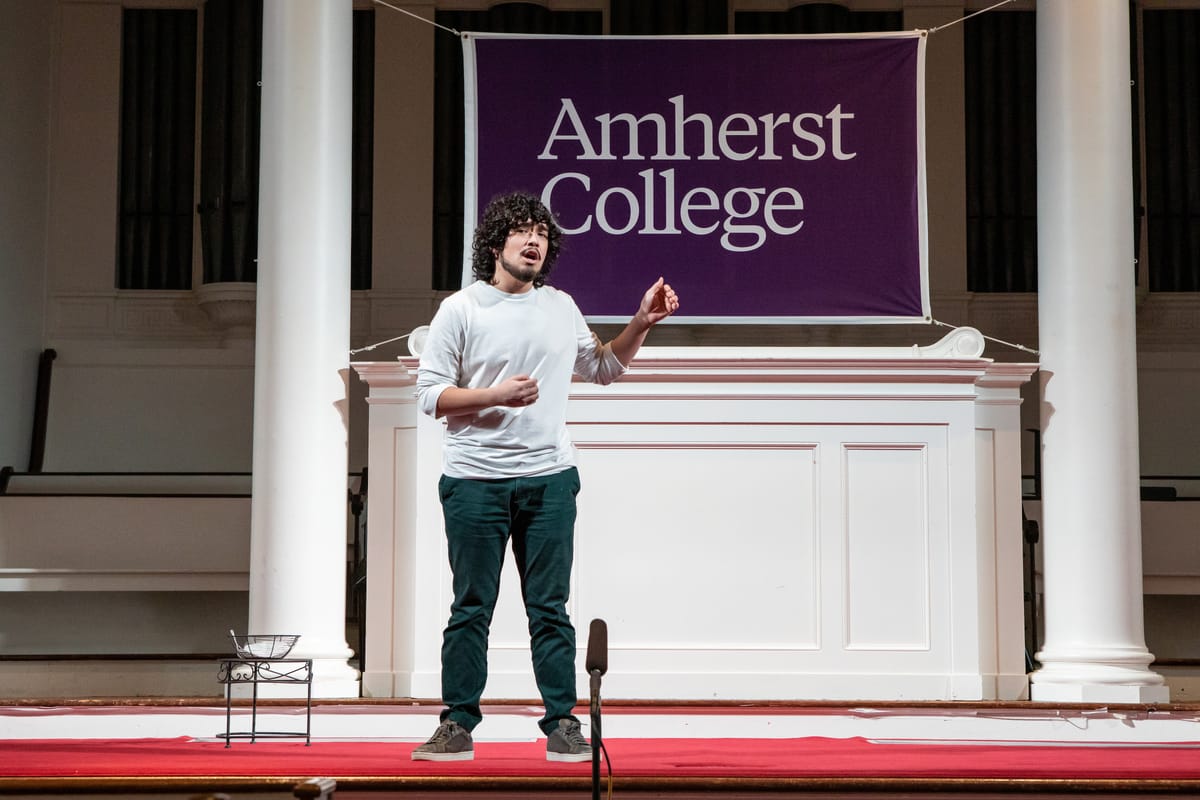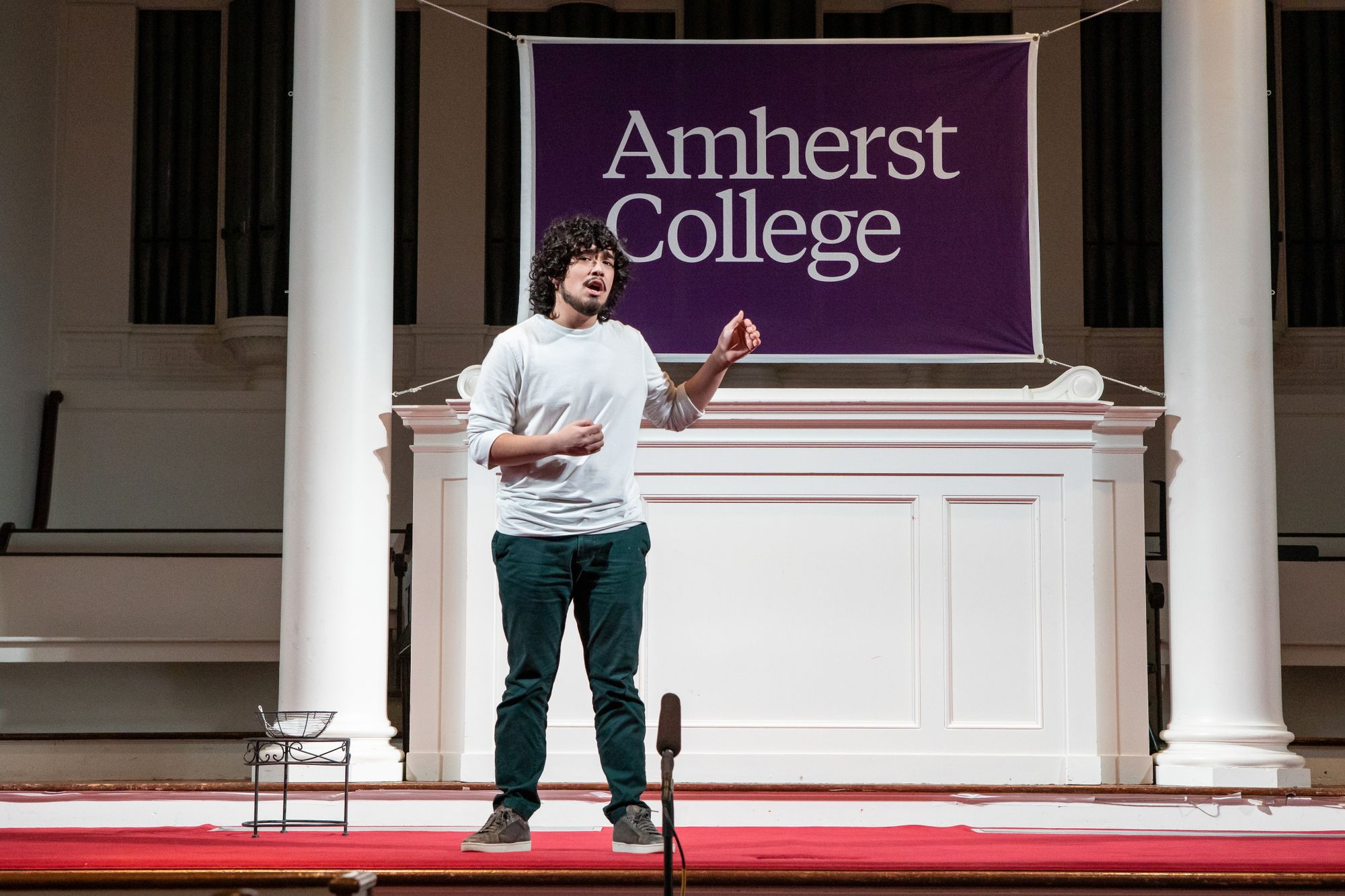The Power of Public Speaking
The college recently hosted its annual public speaking competition and the Litfest Spoken Word Slam. Mikayah Parsons ʼ24 speaks with participants of the events about the lack of a spoken word community at Amherst.


Two weeks ago, I had the opportunity to watch two riveting public speaking events at Amherst. The first, the Writing Center’s annual speaking competition on Feb. 23, saw 11 students perform speeches related to the theme of “Progress.” The next day, the LitFest Spoken Word Slam drew 15 participants to prepare two poems up to three minutes long. These annual competitions typically receive a low to moderate turnout from the student body. Despite this, I witnessed at both events a sense of camaraderie among those students who did attend. As a poet, I look forward to these competitions every year. The poetry contest, which I myself participated in, is an opportunity to keep my creative writing on track, and I always receive inspiration from other students. The speech competition, though not my area of expertise, gives the same invigorating satisfaction upon watching impassioned students perform prepared pieces that capture everything from the current state of campus to their hopes for its future. Looking at the small number of students in the audience, mostly friends of the participants, I wondered what the public speaking community at Amherst is like.
To find out, I sat down with seven students who participated in one of these two competitions to ask about opportunities for public speaking at Amherst, motivations for speaking publicly, and general opinions about the public speaking climate on campus. The interviews ranged from 10 to 20 minutes, from first-years to seniors, from rookies to seasoned performers. Across all of them, though, lurked a thinly veiled desire for a larger public speaking presence on campus. Take, for instance, the words of Tristan Moore ’24. When asked if he felt there was a public speaking community on campus, he responded, “There’s absolutely no community … which is disappointing because I wish I knew about all of the people who are great speakers.”
How did contestants learn about these competitions? Moore laughed, “A friend of mine put it in the campus group chat.” Other students shared similar stories of chance encounters learning about the events.
A few students mentioned Susan Daniels, the public speaking coach at the college, by name. Their anecdotes pointed to larger tensions around a lack of advertising for these events. “Susan Daniels came to our first-year seminar,” shared Sidnie Kulik ’25. Daniyal Ahmad Khan ’22 added, “It’s all about resources. Right now, the college has Susan Daniels. How much will she continue to do? The college should invest more.”
Karen Lee ’25 chuckled, “I don’t understand why there’s a whole public speaking section in the Writing Center when it’s only used once a year.”
A common complaint among students was a lack of opportunities and advertising for public speaking. One student, Joe Sweeney ’25, suggested we have a poetry contest that isn’t tied to a literary festival. Many participants admitted to not knowing the full breadth of opportunities that exist on campus, but they noted the “barrier of information” (Atheek Azmi ’25) as an issue in itself. Students repeatedly expressed that an announcement in the Daily Mammoth is not enough.
The lack of advertising was something I had considered during the Spoken Word Slam. I could not help but wonder how many more students would compete if these contests received the same attention as programs hosted by student-run groups on campus or larger events such as the fall and winter festivals sponsored by the college. I hardly believe — and the interviews confirm — that participants are purely motivated by the prize.
Why is public speaking so important to these students? “Speeches are a succinct way to get across prepared information,” Moore stated. Other students characterized public speaking as passionate, efficient, and effective. They resonated with the power of public speaking to send a message in an accessible way.
Students also noted connection as an incentive for public speaking and emphasized the significance of a community. Many participants hadn’t known their competitors prior to the competition. They reflected with disappointment and rallied for more opportunities for engagement at Amherst. Suggestions included a public speaking club, a greater frequency of events such as these, and implementing public speaking in the curriculum through more presentations or a public speaking class. “I’m a firm believer that we have a public speaking community at Amherst, it’s just that we haven’t found each other as of yet,” said Azmi.
What advice do participants have for newcomers? “People are always surprised when they hear this: I’m always nervous when I perform,” shared Kobe Thompson ’24, the two-time winner of the speech competition. “To feel uncomfortable is to care. You’re going to be nervous.”
“Ride the nervousness,” Sweeney added, with Khan echoing: “All the best things in life require discomfort.”
“Just sign up,” said Azmi. “If you’re already feeling compelled to do it, act on that.”



Comments ()